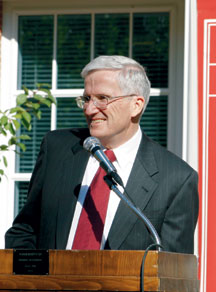From Center Hall |
| Printer-friendly version | Email this article |

I was a bit amused and bemused when Steve Charles told me the theme for this issue would be "Refuge," for I never think of Wabash as a refuge.
Since that conversation with Steve, I have mulled over this topic and listened for this theme when I talk with students.
Although I had not heard it earlier, students do see the College as something of a refuge. They believe it insulates them from the outside world, and that it should be insulated, too. They are not real happy when the outside world intrudes itself upon the campus. They are even less happy when the College itself changes. Many students seem to think their college should never change; it should be one, and perhaps the only, constant they can count on in their lives.
When I first started noticing these observations, I assumed students had in mind the physical changes, and perhaps personnel changes, at the College. (As you know from reading Wabash Magazine, we have built some new buildings and renovated others, and we have had a fair number of senior faculty retire.)
When I asked students what they meant by changes that had been disruptive, they replied readily. Several appeared on everybody's list: Chapel Sing; the Sphinx Club TGIF celebrations moved out of the Little Giant Room; the banning of alcohol in academic buildings. So much for assuming!
Seeing this list, some colleagues respond by saying students need to get over it. They have a lifetime of change ahead of them, and our job is to get them ready for such changes. Perhaps, they continue, we should orchestrate even more changes to prepare them even better for what lies ahead.
It turns out there are changes ahead-not for their own sake, but from the early results of the strategic planning process. We are being encouraged to help students be better prepared for going into the work force. Polls of seniors over the last few years have identified career assistance as the College's major disappointment. We have worked in a variety of ways to improve, but have not had much success. We have learned from these efforts, and we know that to do more for seniors we will need to disrupt the "routine" as they have known it.
Similarly, we know there is great concern for maintaining the traditions within the student culture, even though the world that culture lives within has changed dramatically. To maintain some of the traditions and the values they reinforce, the College may have to assist students more than it has in the past. As we do so, some students will see that help as an intrusion, while others will see it as helpful. We need to work with all constituencies so it is a natural evolution—change that gradually both protects and promotes those values and activities that we hold most dear.
If we are successful, Wabash will continue as that refuge in an otherwise turbulent and often unfriendly world; a place where future generations of students can come to understand themselves better as they get ready to make their way and to make their contribution to the world, and where alumni for generations to come can return to refresh those commitments to better men making a better society.
|
